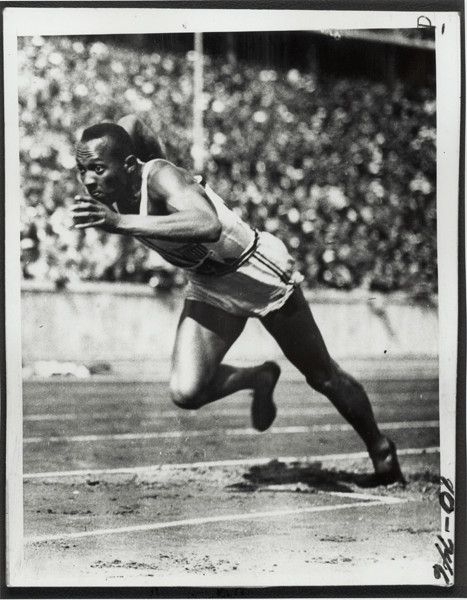Olympian Jesse Owens
1936
Add to Favorites:
Add all page(s) of this document to activity:

During the 1936 Olympics in Berlin, Germany, Jesse Owens won four gold medals: in the 100 meter, 200 meter, long jump, and the 4×100 relay. His performance was widely considered a blow to the Nazi belief in Aryan supremacy. Owens's excellent showing and winning four gold medals was not matched until Carl Lewis won gold in the same events at the 1984 Olympics.
Jesse Owens’s Olympic glory was celebrated around the world, his dominance at the games making him arguably the most famous Olympian. When Owens returned home, however, he was met with prejudice and racism that was prevalent in American society. The son of a sharecropper and the grandson of slaves, he said: "I came back to my native country and I couldn’t ride in the front of a bus. I had to go to the back door. I couldn’t live where I wanted. ...I wasn’t invited up to shake hands with Hitler, but I wasn’t invited to the White House to shake hands with the President, either."
Neither Jesse nor any of the other persons of color that won medals for the United States during the 1936 Olympics were invited to the White House to be received by President Franklin D. Roosevelt (African Americans won six of the 12 gold medals that the United States took home). Owens remained a celebrated figure to the American public, however. President Eisenhower declared Owens an Ambassador to Sports. By 1955, he was a Goodwill Ambassador who traveled the world for the State Department. In 1976, President Ford awarded Owens the highest civilian honor, the Medal of Freedom, in a White House ceremony.
Jesse Owens’s Olympic glory was celebrated around the world, his dominance at the games making him arguably the most famous Olympian. When Owens returned home, however, he was met with prejudice and racism that was prevalent in American society. The son of a sharecropper and the grandson of slaves, he said: "I came back to my native country and I couldn’t ride in the front of a bus. I had to go to the back door. I couldn’t live where I wanted. ...I wasn’t invited up to shake hands with Hitler, but I wasn’t invited to the White House to shake hands with the President, either."
Neither Jesse nor any of the other persons of color that won medals for the United States during the 1936 Olympics were invited to the White House to be received by President Franklin D. Roosevelt (African Americans won six of the 12 gold medals that the United States took home). Owens remained a celebrated figure to the American public, however. President Eisenhower declared Owens an Ambassador to Sports. By 1955, he was a Goodwill Ambassador who traveled the world for the State Department. In 1976, President Ford awarded Owens the highest civilian honor, the Medal of Freedom, in a White House ceremony.
This primary source comes from the Records of the U.S. Information Agency.
National Archives Identifier: 595375
Full Citation: Photograph 306-PSE-80-746; Olympian Jesse Owens; 1936; Master File Photographs of U.S. and Foreign Personalities, World Events, and American Economic, Social, and Cultural Life, ca. 1953 - ca. 1994; Records of the U.S. Information Agency, Record Group 306; National Archives at College Park, College Park, MD. [Online Version, https://docsteach.org/documents/document/jesse-owens, April 23, 2024]Rights: Public Domain, Free of Known Copyright Restrictions. Learn more on our privacy and legal page.



